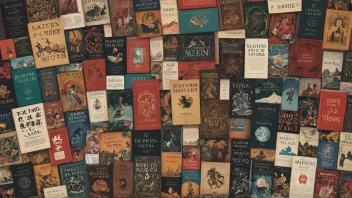What is classic literature?
Classic literature refers to literary works that have stood the test of time and are considered exemplary or noteworthy in their artistic merit, themes, and cultural impact. These works often provide profound insights into the human condition and psychology, making them relevant across generations.
Why is classic literature important for understanding human psychology?
Classic literature delves into the complexities of human emotions, motivations, and behaviors. By exploring the characters, plots, and themes presented in these works, readers can gain a deeper understanding of psychological concepts and the intricacies of human nature. These timeless narratives often mirror the struggles and triumphs of individuals, allowing readers to reflect on their own experiences and emotions.
How do classic authors portray psychological themes?
Classic authors, such as Shakespeare, Dostoevsky, and Austen, utilize rich character development and intricate plots to showcase psychological themes. They explore concepts like love, jealousy, ambition, and morality, often illustrating the inner conflicts faced by their characters. This portrayal enables readers to empathize with the characters, leading to a greater understanding of human psychology.
Can studying classic literature improve empathy?
Yes, studying classic literature can enhance empathy. When readers engage with diverse characters and their experiences, they are often prompted to consider perspectives different from their own. This engagement fosters emotional connections and encourages readers to reflect on their own feelings and reactions, ultimately cultivating a deeper sense of empathy.
What role does context play in understanding classic literature?
The historical and cultural context in which a classic work was written significantly influences its themes and character portrayals. Understanding the societal norms, values, and psychological theories of the time can provide valuable insights into the motivations behind characters' actions, as well as the underlying messages of the text. This context is essential for a full appreciation of the psychological depth present in these works.
Which classic literary works are most effective in exploring human psychology?
- Crime and Punishment by Fyodor Dostoevsky - This novel delves into guilt, redemption, and the moral dilemmas faced by its protagonist.
- Pride and Prejudice by Jane Austen - Through its exploration of social class and romantic relationships, this novel highlights themes of pride, prejudice, and self-awareness.
- Hamlet by William Shakespeare - This play offers a profound look at madness, revenge, and existential angst.
- Wuthering Heights by Emily Brontë - This work examines obsession, passion, and the complexities of human relationships.
How can readers engage with classic literature to better understand psychology?
Readers can engage with classic literature by participating in book clubs, online discussions, or academic courses focused on literary analysis. Reflective journaling while reading can also be beneficial, as it encourages readers to relate the characters' experiences to their own lives. Additionally, exploring adaptations, such as films or plays, can provide further insights into the psychological themes presented in the original works.
Are there modern psychological theories that relate to classic literature?
Indeed, many modern psychological theories can be connected to themes in classic literature. For instance, Freudian concepts of the unconscious mind, Jungian archetypes, and contemporary theories of emotional intelligence can all be observed in the character dynamics and conflicts present in classic works.
How can educators use classic literature to teach psychological concepts?
Educators can utilize classic literature as a tool to teach psychological concepts by incorporating guided discussions, character analysis, and thematic explorations into their curriculum. By encouraging students to draw parallels between literary characters and psychological theories, educators can help deepen students' understanding of both literature and psychology.
What are some challenges in interpreting classic literature?
Challenges in interpreting classic literature include language barriers, cultural differences, and the evolution of societal norms. Readers may struggle to relate to characters or themes that were more relevant in the context of their time. To mitigate these challenges, supplemental resources, such as literary analyses or historical context guides, can be beneficial.
In conclusion, classic literature serves as a powerful lens through which we can explore human psychology. By examining the characters and themes within these enduring works, readers can gain valuable insights into themselves and the world around them. Embracing these timeless narratives not only fosters a love for reading but also enhances our understanding of the complexities of human nature.






